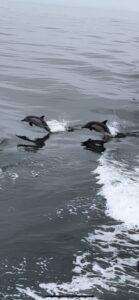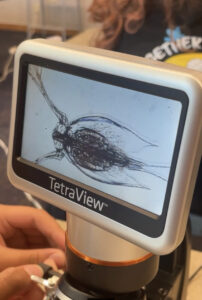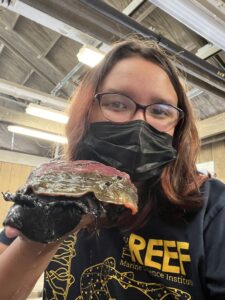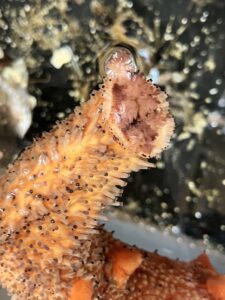Hello Everyone! If you haven’t read any of my blogs before, I’m Amiyah Ogo. I attend Montezuma-Cortez High School and I’m attending my Internship at the REEF at UCSB in Santa Barbara, California. This week was my last week and it was super eventful. Before I start off this blog I wanted to thank Sarah and All the Pinhead Staff for helping me get this amazing opportunity. I also wanted to thank my mentor Scott Simon as well as his amazing staff of REEFers who helped make the experience so memorable.
This week was dedicated to the Tech Trek Math and Science Camp for Girls. On Monday we started off with introducing ourselves to the Marine Biology class of campers and went down to the REEF. While down at the REEF we explored “Our Maritime Community” Which is composed of four main themes, “Our Beaches” “Our Watershed” “Our Channel” and “Our Harbor”. To do this we went down on the Beach to explore “Our Beaches”. We went to the boatyard to explore “Our Harbor”. We went on top of the filter house to explore “Our watershed” and finally we went into the REEF to explore “Our Channel ”. Today we also got to meet all of the other campers since this year Tech Trek did Cross-Core Classes so every camper can experience every class. We linked Marine Biology to the other classes which were Forensics, Aerospace, and Robotics.
On Tuesday We went on a Boat with all of the Campers. We rode on the Condor Express which is actually used for whale watching but we  used it for different things. We went to the mussel farm and talked about Mariculture. Mariculture is basically aquatic food production for human consumption. We also explored plankton when we got to Campus Point and did a Plankton tow. We collected two different types of plankton. Zooplankton and Phytoplankton, ZooPlankton are Animals, and Phytoplankton are plants. Plankton is often described as microscopic organisms, but not all plankton is microscopic, plankton means to drift so that’s how we identify it. We used two different nets to do our tow to collect plankton. A larger net was used for Zooplankton and a smaller net was used for Phytoplankton. Once we finished the tow and gathered plankton we went off whale watching! We didn’t see and whales unfortunately, but we saw Sea Lions and a whole lot of Dolphins. When we got back to the classroom from the boat the Campers looked at some of the plankton we gathered for the first time. After the campers looked at plankton we did the Amazing Race, where all of the campers get separated into groups and race around to cool spots on the UCSB campus by using only coordinates, a map, and clues. None of the teams ended up finishing, but it was still a lot of fun!
used it for different things. We went to the mussel farm and talked about Mariculture. Mariculture is basically aquatic food production for human consumption. We also explored plankton when we got to Campus Point and did a Plankton tow. We collected two different types of plankton. Zooplankton and Phytoplankton, ZooPlankton are Animals, and Phytoplankton are plants. Plankton is often described as microscopic organisms, but not all plankton is microscopic, plankton means to drift so that’s how we identify it. We used two different nets to do our tow to collect plankton. A larger net was used for Zooplankton and a smaller net was used for Phytoplankton. Once we finished the tow and gathered plankton we went off whale watching! We didn’t see and whales unfortunately, but we saw Sea Lions and a whole lot of Dolphins. When we got back to the classroom from the boat the Campers looked at some of the plankton we gathered for the first time. After the campers looked at plankton we did the Amazing Race, where all of the campers get separated into groups and race around to cool spots on the UCSB campus by using only coordinates, a map, and clues. None of the teams ended up finishing, but it was still a lot of fun!
On Wednesday we started off in the classroom with the marine science group. We counted some plankton to try and figure out how much plankton was in a certain area.  We also went down to the REEF and went to look at the white abalone, as well as the holding facility. The REEF is part of the project on trying to bring back the white abalone. The white abs were so over fished that they have become reproductively extinct in the wild. This means that they can still be found in the wild but they can’t reproduce. This is because abalone are broadcast spawners, so since there aren’t enough of them in one area their gonads, which are their sperm and egg, aren’t able to meet in the water to fertilize. After this I went to the REEF to do my last aquarist task, which was siphoning. If you don’t know this is how we clean all of the leftover food and waste out of the tank
We also went down to the REEF and went to look at the white abalone, as well as the holding facility. The REEF is part of the project on trying to bring back the white abalone. The white abs were so over fished that they have become reproductively extinct in the wild. This means that they can still be found in the wild but they can’t reproduce. This is because abalone are broadcast spawners, so since there aren’t enough of them in one area their gonads, which are their sperm and egg, aren’t able to meet in the water to fertilize. After this I went to the REEF to do my last aquarist task, which was siphoning. If you don’t know this is how we clean all of the leftover food and waste out of the tank
On Thursday we helped the campers create their own experiment! We separated the marine biology class into groups and gave them organisms at the beginning of the week. Now they used all the information they learned to make a species ID card. This had the scientific name, phylum, and stuff like that on it. Once they were done we came up with an experiment to answer some of their questions. We ended up doing a race between a Red Abalone, and a Kellet’s Welk to see which one could move the fastest. We used their favorite food to lure them, which in this case was kelp and anchovies. Unfortunately the results were inconclusive and the Welk actually ended up going backwards. But it was an important lesson because zero’s are still pieces of data in science.
 On Friday we wrapped up in the classroom with the marine science class and then had lunch. Then we split all of the campers up into three groups for what we called beach day! Each group had about 3-5 girls from the marine science class, so we let them take the ropes and teach their campers about the stuff they had learned about the organisms in the REEF. They also went down to the beach to do some surfing, and the we also went up on the bluffs to learn about some other cool stuff! I also said goodbye to the REEFers I had worked with and had learned so much from.
On Friday we wrapped up in the classroom with the marine science class and then had lunch. Then we split all of the campers up into three groups for what we called beach day! Each group had about 3-5 girls from the marine science class, so we let them take the ropes and teach their campers about the stuff they had learned about the organisms in the REEF. They also went down to the beach to do some surfing, and the we also went up on the bluffs to learn about some other cool stuff! I also said goodbye to the REEFers I had worked with and had learned so much from.
Saturday I went into work bright and early to see what the campers came up with for their final project. After they were done with their presentations my mentor, Scott, dropped me off at the airport to fly back home to Colorado.
My internship was such a valuable experience for me. I learned so much about Marine Biology, College life, and what I think I might want to do after high school. I learned that I don’t really like research, but I really liked doing programs at the REEF and teaching kids about the different organisms. Overall an amazing experience and a great last week! 

There are no comments published yet.